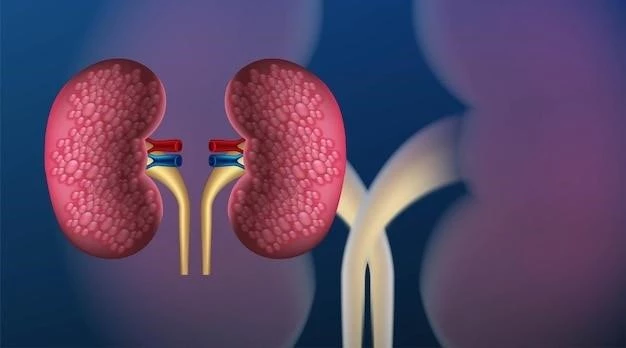Introduction to Nephrocalcinosis
Nephrocalcinosis is a disorder characterized by the deposition of excess calcium in the kidneys.
Nephrocalcinosis is a disorder characterized by the deposition of excess calcium in the kidneys. It can be caused by various underlying conditions leading to high levels of calcium in the blood or urine. While the disorder may not always present early symptoms‚ it can lead to complications such as kidney stones and chronic kidney failure if left untreated. Diagnosis typically involves imaging tests to assess the extent of calcium deposits in the kidneys.
Definition and Overview
Nephrocalcinosis is characterized by the deposition of excess calcium in the kidneys‚ often linked to high calcium levels in the blood or urine.
Nephrocalcinosis can be caused by various disorders that lead to elevated calcium levels in the blood or urine‚ such as hyperparathyroidism and renal tubular acidosis. Other conditions include Alport syndrome‚ Bartter syndrome‚ and hypercalcemia. These disorders can contribute to the excess deposition of calcium in the kidneys‚ leading to nephrocalcinosis.
Less Common Causes and Risk Factors
Nephrocalcinosis usually involves the renal medulla or‚ less commonly‚ the cortex. Conditions that may lead to high calcium levels and‚ therefore‚ nephrocalcinosis include hyperparathyroidism‚ renal tubular acidosis‚ Alport syndrome‚ Bartter syndrome‚ and hypercalcemia. These underlying disorders can contribute to the excessive deposition of calcium in the kidneys‚ which characterizes nephrocalcinosis.
Common Disorders Leading to High Calcium Levels
Nephrocalcinosis can be caused by various disorders that lead to elevated calcium levels in the blood or urine‚ such as hyperparathyroidism and renal tubular acidosis. Other conditions include Alport syndrome‚ Bartter syndrome‚ and hypercalcemia. These disorders can contribute to the excess deposition of calcium in the kidneys‚ leading to nephrocalcinosis.
Late signs and Symptoms
Signs of nephrocalcinosis can include chronic kidney failure‚ which may lead to symptoms such as fatigue‚ swelling‚ and changes in urination habits. It is crucial to monitor kidney function regularly to detect any complications promptly.
Early Signs and Symptoms
Nephrocalcinosis may not initially present noticeable symptoms. However‚ in some cases‚ individuals may experience blood in the urine‚ flank pain‚ frequent urinary tract infections‚ and kidney stones. Early detection and diagnosis are crucial to prevent potential complications associated with the disorder.
Late Signs and Symptoms
Signs of nephrocalcinosis can include chronic kidney failure‚ which may lead to symptoms such as fatigue‚ swelling‚ and changes in urination habits. It is crucial to monitor kidney function regularly to detect any complications promptly.
Relation to Nephrolithiasis
Nephrocalcinosis is related to‚ but not the same as‚ kidney stones (nephrolithiasis). Conditions that can cause nephrocalcinosis include hyperparathyroidism‚ renal tubular acidosis‚ and genetic disorders such as Bartter syndrome. While nephrocalcinosis involves the deposition of calcium within the kidneys‚ kidney stones are generally formed by crystals in the urinary tract. Both conditions can have overlapping symptoms and may require different treatment approaches.
Nephrocalcinosis can lead to chronic kidney failure‚ characterized by decreased kidney function over time. Monitoring and managing this association is crucial for long-term kidney health.
Nephrocalcinosis can lead to chronic kidney failure‚ characterized by decreased kidney function over time. Monitoring and managing this association is crucial for long-term kidney health.
Nephrocalcinosis can lead to chronic kidney failure‚ characterized by decreased kidney function over time. Monitoring and managing this association is crucial for long-term kidney health.

Treatment for nephrocalcinosis aims to reduce the excess calcium deposits in the kidneys. This may involve dietary changes‚ medication to regulate calcium levels‚ and addressing underlying disorders causing high calcium levels. Proper management is essential to prevent complications associated with nephrocalcinosis.
Association with Chronic Kidney Failure
Nephrocalcinosis can lead to chronic kidney failure‚ characterized by decreased kidney function over time. Monitoring and managing this association is crucial for long-term kidney health.
Reducing Calcium Build-Up in the Kidneys
Treatment for nephrocalcinosis focuses on reducing calcium deposits in the kidneys through dietary changes‚ medications‚ and addressing underlying causes of high calcium levels. Proper management is essential to prevent complications and preserve kidney function.
Preventing Further Calcium Deposits
Preventive measures involve managing underlying conditions that contribute to high calcium levels‚ implementing dietary changes to reduce calcium intake‚ and taking prescribed medications. By addressing these factors‚ further calcium deposits in the kidneys can be minimized‚ helping to prevent complications associated with nephrocalcinosis.
Regular monitoring is essential to track kidney function and the progression of nephrocalcinosis. Follow-up care involves periodic imaging tests and laboratory assessments to evaluate calcium levels and kidney health. Close medical supervision can help identify any issues early and adjust treatment strategies accordingly.
Monitoring and Follow-Up Care
Regular monitoring is essential to track kidney function and the progression of nephrocalcinosis. Follow-up care involves periodic imaging tests and laboratory assessments to evaluate calcium levels and kidney health. Close medical supervision can help identify any issues early and adjust treatment strategies accordingly.
Importance of Timely Treatment

Timely treatment for nephrocalcinosis is crucial in preventing further kidney damage and reducing the risk of complications. Early intervention can help manage calcium levels‚ alleviate symptoms‚ and preserve kidney function‚ emphasizing the importance of prompt medical attention upon diagnosis.
Preventive Measures and Lifestyle Changes
Preventive measures and lifestyle changes play a vital role in managing nephrocalcinosis. These measures include staying hydrated‚ following a balanced diet‚ avoiding excess calcium intake‚ and addressing underlying conditions that contribute to high calcium levels. Lifestyle modifications can help minimize the risk of further calcium deposits in the kidneys and promote overall kidney health.
For further information on nephrocalcinosis‚ consult medical websites‚ academic journals‚ and healthcare professionals for accurate and up-to-date resources about this kidney disorder.
Credible Sources and Further Reading
For more in-depth information on nephrocalcinosis‚ it is advisable to consult medical textbooks‚ peer-reviewed articles‚ and reputable medical websites for comprehensive insights into this kidney disorder and its management.
